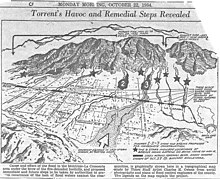Crescenta Valley flood (1933 and 1934)
In late 1933, wildfires burned much of the trees and grass in the Crescenta Valley. During the last week of December of that year, a series of winter storms pounded the mountainside with 12 inches (300 mm) of rain. On New Year's Eve, more heavy rains led to flooding, leading to the collapse of earthen dams, leading to the destruction of many homes in the valley.
Background

In November 1933, wildfires raged through the nearby San Gabriel mountains above the communities of La Crescenta, La Cañada and Montrose. During the last week of December of that year, a series of winter storms pounded the mountainside with 12 inches (300 mm) of rain. On New Year's Eve, more heavy rains led to sporadic flooding.
New Year's Eve
Around midnight, hillsides in at least three mountain locations collapsed sending millions of tons of mud and debris into the Crescenta Valley neighborhoods below.[1]
More than 400 homes were destroyed in La Cañada, La Crescenta, Montrose and Tujunga. Scores of people were killed, and hundreds were left homeless. Entire families were wiped out. The mudslides that began in the mountains above La Cañada and La Crescenta carved a path of destruction all the way to the Verdugo Wash and beyond.
Aftermath

Some Montrose residents sought shelter from flooding at American Legion Post 288, which was destroyed, killing 12.[2]
Parts of Foothill Boulevard were buried under 12 feet (4 m) of mud, boulders and debris. The mud was deep enough to bury cars completely on Montrose Avenue. Miles of Honolulu Boulevard were inundated by several feet of sand and silt.
Two notable victims of the flood were silent-era identical-twin child actors Winston and Weston Doty, who died at the age of 19.[3][4]
Following the disaster, the U.S. Army Corps of Engineers and the County of Los Angeles built a flood control system of catch basins and concrete storm drains, designed to prevent a repeat of the 1934 disaster.[5]
The flood was commemorated in Woody Guthrie's song "Los Angeles New Year's Flood".[6] To honor the victims of that New Year's calamity and to mark its 75th anniversary, a small monument was dedicated January 1, 2004, at Rosemont and Fairway avenues in Montrose, near where the American Legion Hall had stood.
References
- ^ Merl, Jean (25 January 2009). "Montrose flood roared through the Crescenta Valley as 1934 began". Retrieved 23 March 2018 – via LA Times.
- ^ Los Angeles Times, January 2, 3, 4, 5, 1934
- ^ "Trojan's Famous Twin Cheer Leaders Drown" - San Antonio Light (San Antonio, Texas) January 3, 1934 pg. 8
- ^ San Antonio Light (San Antonio, Texas) January 20, 1934 pg. 3
- ^ "Images of America: La Crescenta" Mike Lawler and Robert Newcombe. Arcadia Pub. 2005
- ^ ""Los Angeles New Years Flood" by Woody Guthrie". Woodyguthrie.org. Retrieved 23 March 2018.
